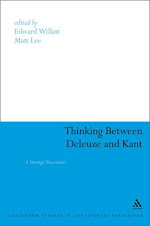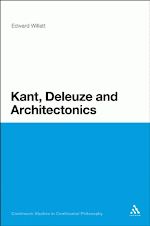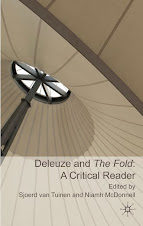JULY 2006 'The Work of Gilles Deleuze' Conference Report
‘The Work of Gilles Deleuze’ Conference took place on Saturday on a very sunny day amidst the baroque splendour of the Maritime Campus. Greenwich played host to a fruitful meeting of Deleuze scholars and featured a series of fascinating and vital papers at the cutting edge of this field. Three parallel session ran in the morning and three in the afternoon. Scholars attended from across the UK and abroad, some having made long journeys to be here.
In the morning one session featured two papers that used artworks in order to explore and develop aspects of Deleuze’s work. This included Juan Usle’s work in Cath Ferguson’s paper, where it was related to bio-semiotics. A film made by Steven Eastwood, the second speaker of the session, was shown and raised issues about the practice and value of editing. The session also engaged with Deleuze’s critique of representation, his problematisation of sensation and work on the rhizome and body without organs.
A session featuring Matt Lee, Maria Lakka and Michael McGuire was animated by a common thread: the problem of the political for Deleuze. A further session featured Dror Yinon on the relation of Kant and Deleuze, Tristan Moyle on McDowell and Deleuze, and Patricia Farrell on paratactic narrative in Deleuze. These pushed the boundaries of research on Deleuze.
After lunch the grand council chamber was the setting for a papers on Deleuze and Stoicism, by John Sellars, and Deleuze and Whitehead, by Keith Robinson. These stimulated keen discussion and offered new directions for Deleuze scholarship in the further development of these dimensions of his thought.
Across the courtyard of Queen Anne Court another session featured a paper by Ed Romein and Sjoerd van Tuinen on the ‘City Without Predicates’ and one from Wim Christiaens on ‘Bergson and Quantum Theory.’ These papers explored themes at the heart of Deleuze’s work. The role of Leibniz and Deleuze’s interest in the urban were at the fore. The second paper presented classical and quantum systems in order to open up and develop highly productive areas in Difference and Repetition. A further session took place in which Gulsen Bal spoke on art production and the political, while Ils Huygens developed ideas of affect and image.
Given such a great set of sessions I for one wished that I could be in three places at once. This review reflects the fact that its author, of necessity, attended only two sessions and so relied upon reports about the other four. Readers are welcome to e-mail we36[at]greenwich.ac.uk if they would like to add to this report with anything the author missed or neglected.
The speakers and participants deserve great thanks for the papers and discussions that were at all times first rate and of great contribution to Deleuze scholarship.
In the morning one session featured two papers that used artworks in order to explore and develop aspects of Deleuze’s work. This included Juan Usle’s work in Cath Ferguson’s paper, where it was related to bio-semiotics. A film made by Steven Eastwood, the second speaker of the session, was shown and raised issues about the practice and value of editing. The session also engaged with Deleuze’s critique of representation, his problematisation of sensation and work on the rhizome and body without organs.
A session featuring Matt Lee, Maria Lakka and Michael McGuire was animated by a common thread: the problem of the political for Deleuze. A further session featured Dror Yinon on the relation of Kant and Deleuze, Tristan Moyle on McDowell and Deleuze, and Patricia Farrell on paratactic narrative in Deleuze. These pushed the boundaries of research on Deleuze.
After lunch the grand council chamber was the setting for a papers on Deleuze and Stoicism, by John Sellars, and Deleuze and Whitehead, by Keith Robinson. These stimulated keen discussion and offered new directions for Deleuze scholarship in the further development of these dimensions of his thought.
Across the courtyard of Queen Anne Court another session featured a paper by Ed Romein and Sjoerd van Tuinen on the ‘City Without Predicates’ and one from Wim Christiaens on ‘Bergson and Quantum Theory.’ These papers explored themes at the heart of Deleuze’s work. The role of Leibniz and Deleuze’s interest in the urban were at the fore. The second paper presented classical and quantum systems in order to open up and develop highly productive areas in Difference and Repetition. A further session took place in which Gulsen Bal spoke on art production and the political, while Ils Huygens developed ideas of affect and image.
Given such a great set of sessions I for one wished that I could be in three places at once. This review reflects the fact that its author, of necessity, attended only two sessions and so relied upon reports about the other four. Readers are welcome to e-mail we36[at]greenwich.ac.uk if they would like to add to this report with anything the author missed or neglected.
The speakers and participants deserve great thanks for the papers and discussions that were at all times first rate and of great contribution to Deleuze scholarship.





